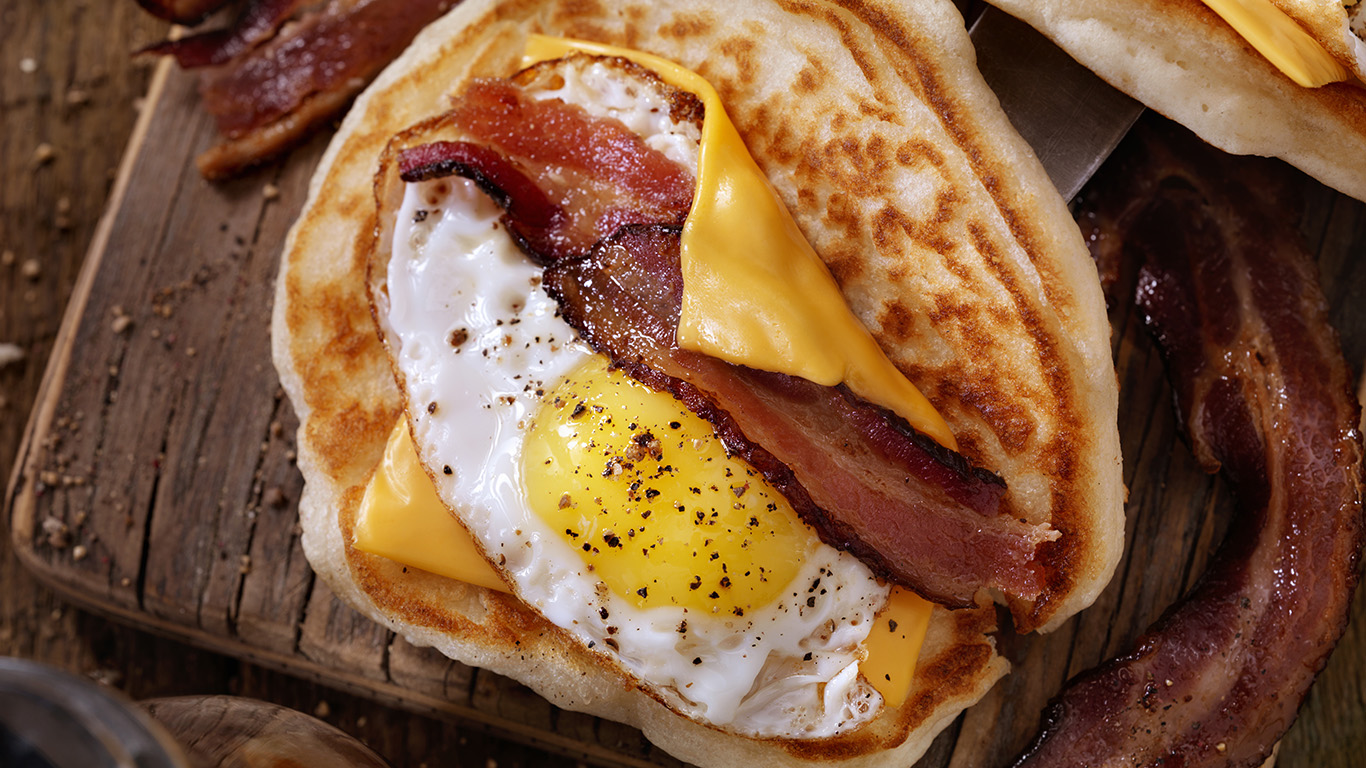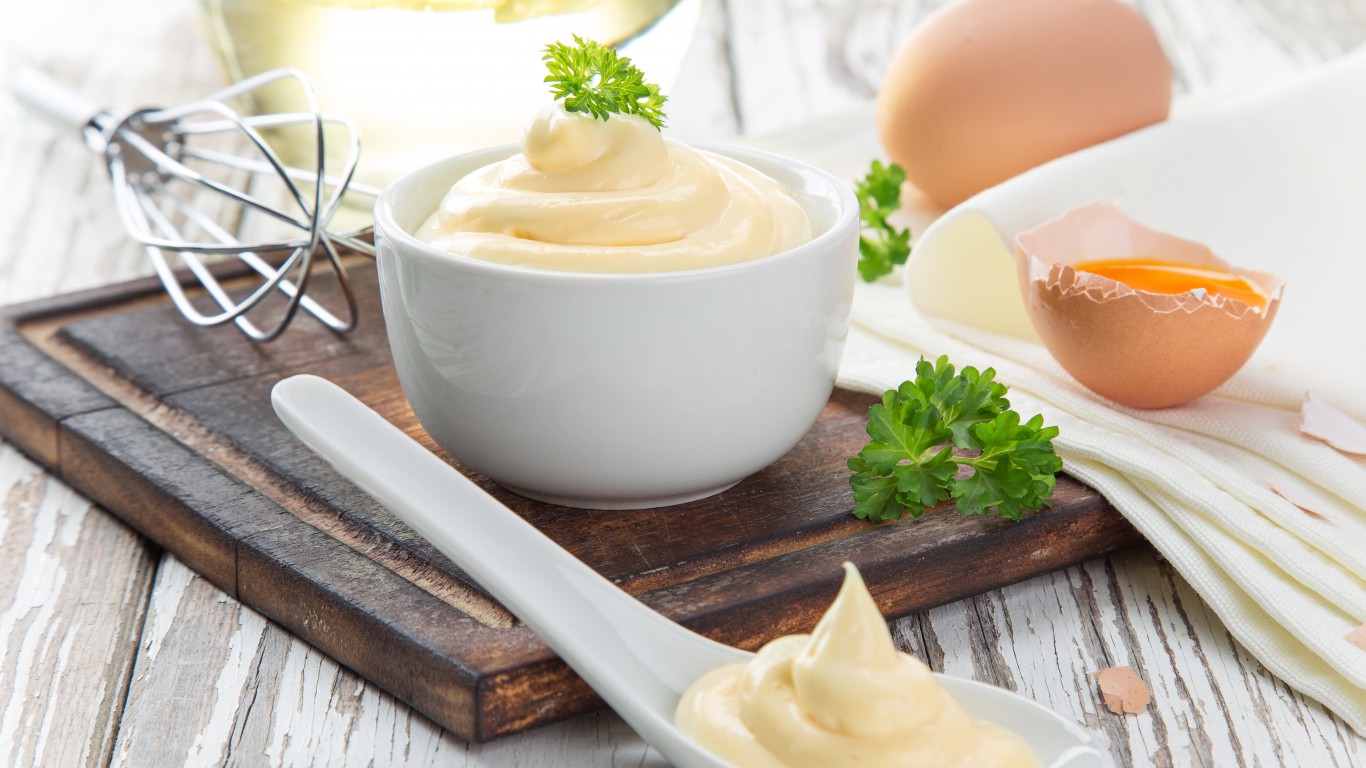

Mayonnaise is a polarizing condiment. There are those who love it for its creaminess and tangy flavor and those who don’t. While some folks enjoy mayonnaise in sauces, dressings, and spreads, others find its texture and flavor unequivocally revolting. And as if the debate over mayonnaise isn’t passionate enough, we can’t ignore the wedge that further divides: mayonnaise vs. whipped dressing. But wait! There’s more! The very origin of mayonnaise is a subject of contentious debate. Are its roots French or Spanish? While its provenance remains murky, its popularity remains undisputed. 24/7 Wall St.’s list of 7 mayonnaise (and whipped dressing) brands to avoid factors in flavor, healthfulness, and value. Because these metrics are not science-based, we present the list in alphabetical order.
Dr. Oetker FunFoods Veg Mayonnaise Original
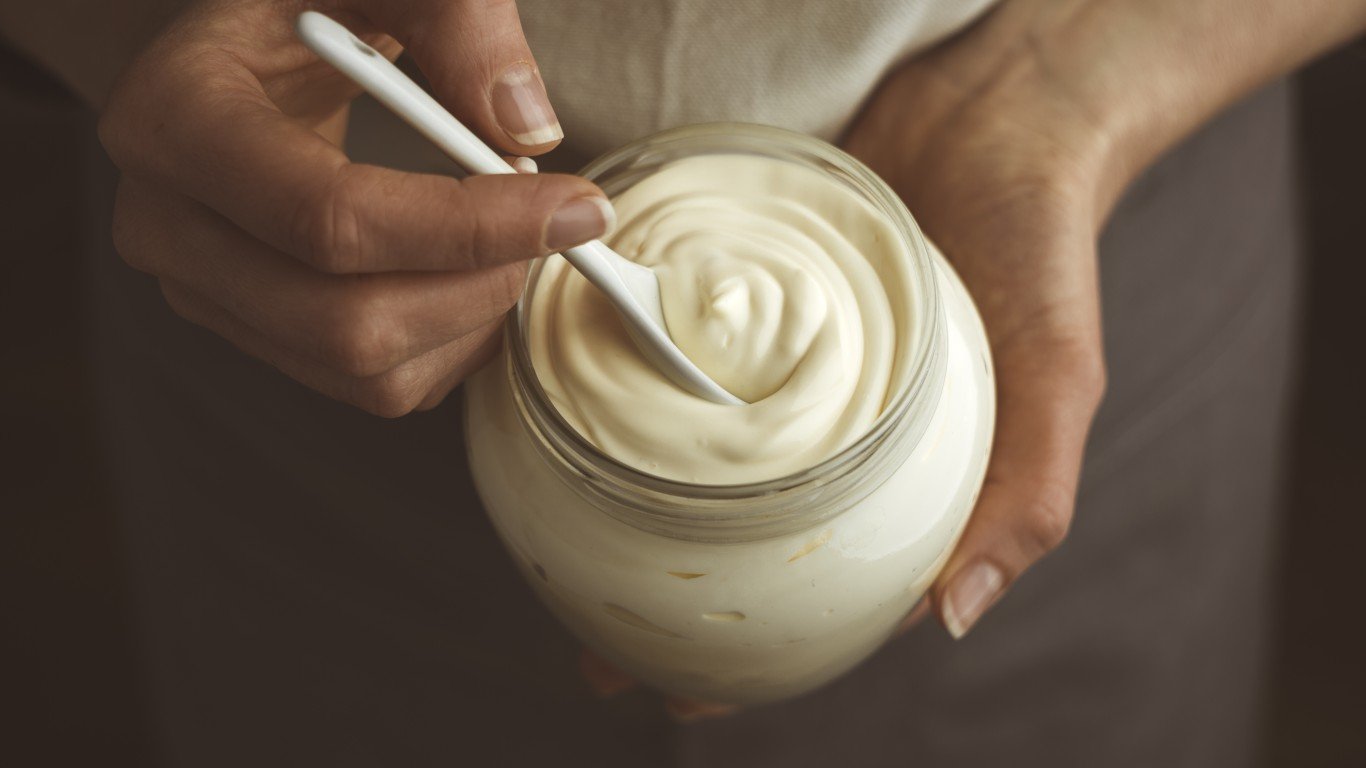
- parent/owner: Dr. Oetker India Pvt. Ltd.
- established: 1891
- price point: $0.61/1.0 oz.
This brand, produced in India, by the German multinational company Dr. Oetker, markets itself as a health food. The eponymous Dr. Oetker, August, was a pharmacist/businessman who bought an established company and turned it into the globalopoly it is today. Or rather his grandson, Rudolf August Oetker did. Rudolf Oetker, a Waffen SS officer during WWII, used the family’s fortune and influence to purchase companies across the globe. Beyond nefarious connections, Dr. Oetker FunFoods Veg Mayonnaise Original isn’t the healthful alternative you might imagine, what with Dr. and Veg in the name, and being marketed as heart-healthy because it is absent transfats. The ingredient list, however, reads more like embalming fluid than mayonnaise. Emulsifiers & Stabilizers? Acidity Regulators?Preservatives?
Bottom line: Even without the questionable ties, Dr. Oetker FunFoods Veg Mayonnaise Original is best left on the shelf.
Hellman’s Heavy-Duty Vegan Dressing and Sandwich Spread
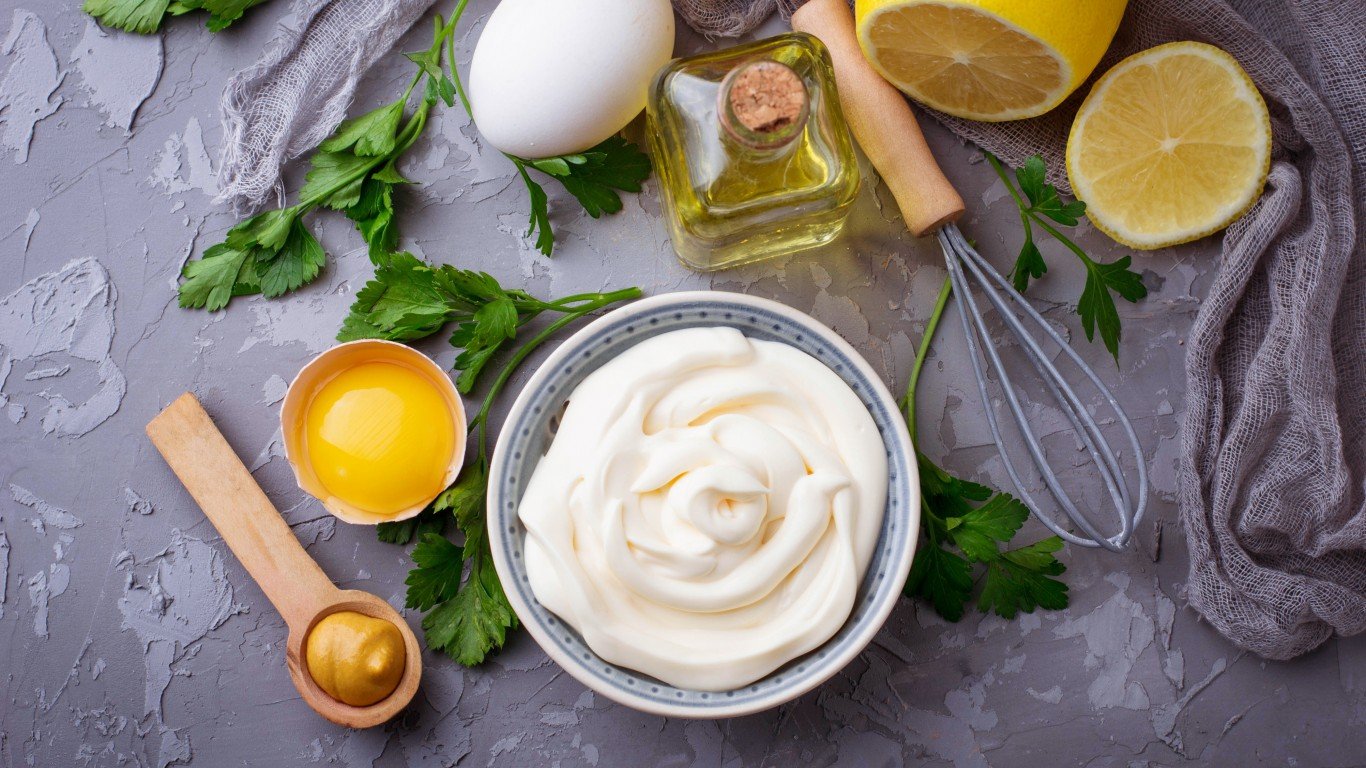
- parent/owner: Unilever
- established: 1913
- price point: $0.20/1.0 oz
According to the Food and Drug Administration (FDA), mayonnaise must contain vegetable oil, egg yolk, and vinegar or lemon juice. It must also meet certain criteria for fat content and acidity. Hellman’s Heavy-Duty Vegan Dressing and Sandwich Spread does not meet those requirements, though on the Unilever site they call it mayonnaise. The audacity! What is this the Wild West? Sandwich spread, mayonnaise, call it what you will, it’s not the most healthful alternative to bonafide, FDA-approved mayonnaise. I don’t know – are vegans just trying to save the planet or are they in it for the plausible health benefits?
The most questionable ingredient in Hellman’s Heavy-Duty Vegan Dressing and Sandwich Spread is calcium disodium EDTA. EDTA, ethylenediamine tetraacetic acid, is used to treat lead poisoning, as its chelating properties remove heavy metals from the blood. As a food additive, it aids product stability, prolonging shelf-life. EDTA has been judged safe by the FDA, in limited amounts. Though studies are ongoing, the evidence is pointing to EDTA’s potential to build up in the body, resulting in a variety of ailments from rashes and asthma to migraines and calcium depletion.
Bottom line: If you’ve adopted a vegan diet for the health benefits, steer clear of this product. If you’re vegan because you want to save the plant, steer clear of this brand. Highly processed foods aren’t that Earth-friendly.
Kewpie Mayonnaise
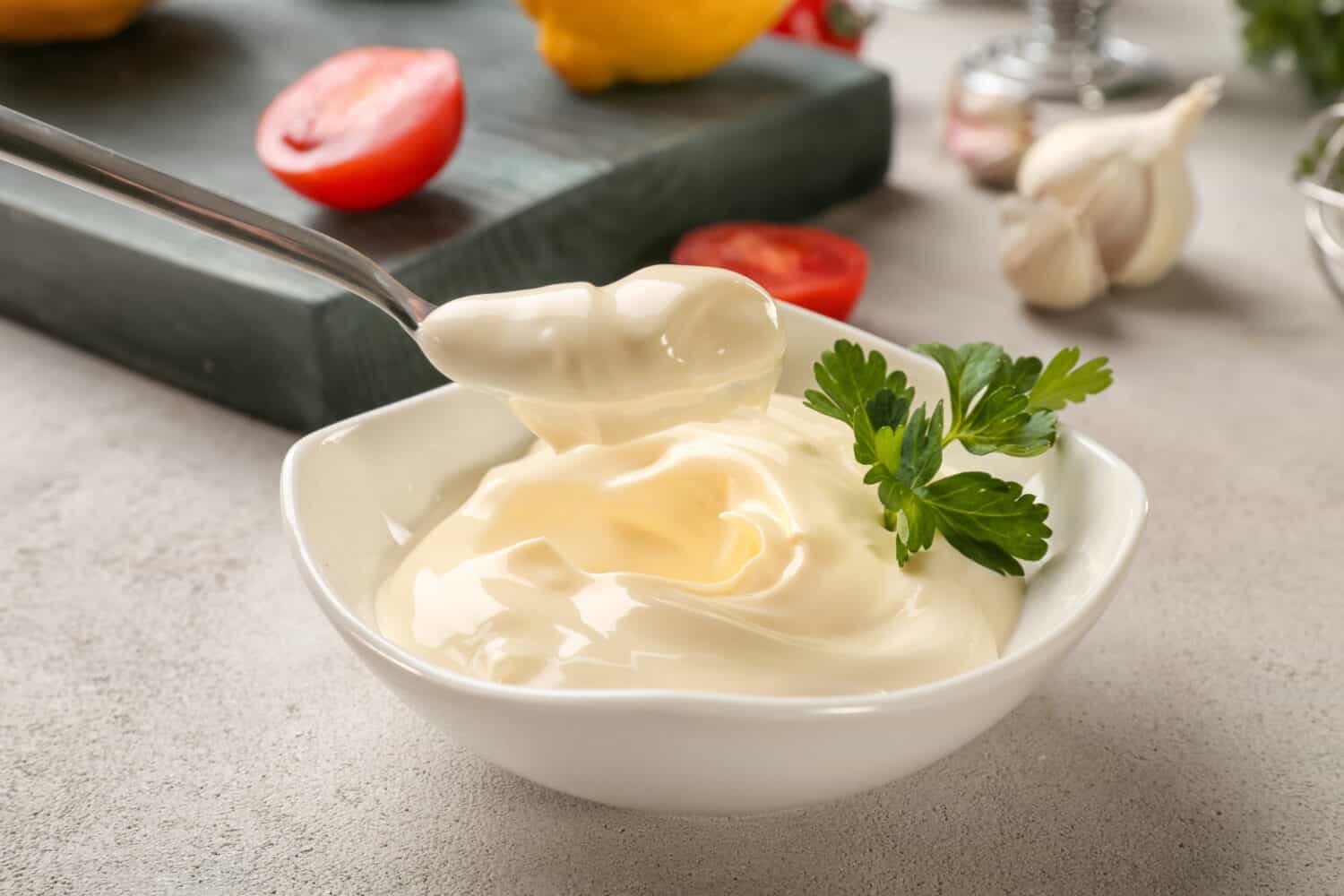
- parent/owner: Kewpie Corporation/Q&B Foods
- established:1925
- price point $0.44/1.0 0z.
Kewpie is a Japan-based brand of mayonnaise that became trendy in the U. S. thanks to Tik-Tok influencer Emily Mariko and her sushi bowl recipe. And though it passes the FDA’s requirements for mayonnaise, Kewpie has a bonus ingredient: MSG. Monosodium glutamate is a preservative found in a variety of processed foods. While it has been deemed safe when ingested in small amounts by the FDA, MSG does have the potential to cause allergic reactions in some consumers, including flushing, heart palpitations, and migraines. Most reactions are mild and do not require medical intervention.
Bottom line: If you’re sensitive to MSG, choose a different mayonnaise for your sushi. Also, FTR? Mayonnaise is not a traditional sushi condiment.
Kraft Avocado Oil Mayonnaise
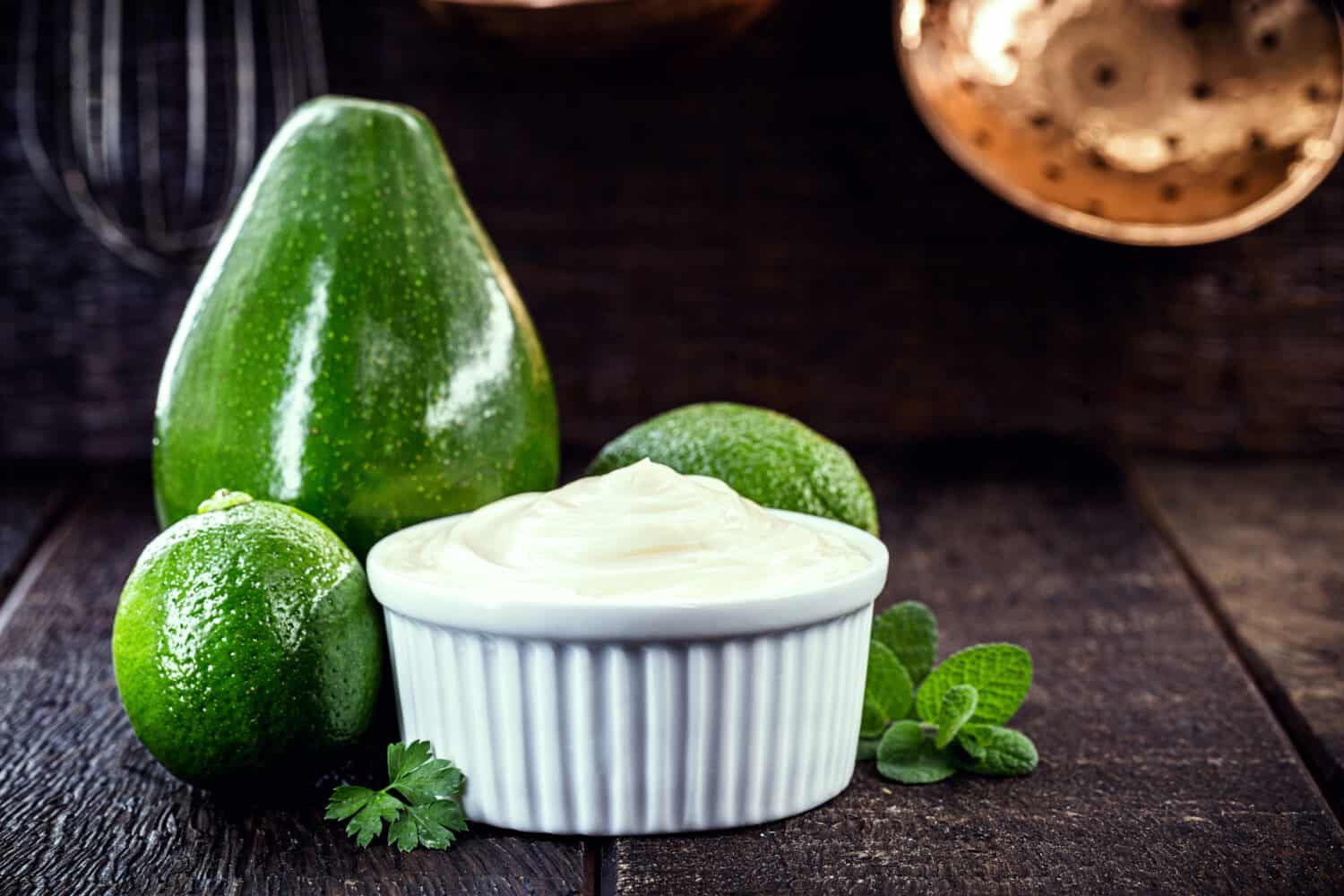
- parent/owner: Kraft Heinz
- established: 1930
- price point: $0.17/1.0 oz.
The most affordable option on our list of 7 mayonnaise brands to avoid, Kraft Avocado Oil Mayonnaise is filled with surprising ingredients. For starters besides avocado oil, Kraft Avocado Oil Mayonnaise contains canola oil and soybean oil. Presumably avocado oil, the second listed ingredient, is the principal oil, but canola oil and soybean oil, are the third and fourth ingredients. That’s a lot of oil. And a little misleading.
Kraft also contains three ingredients (modified food starch, phosphoric acid, and potassium sorbate) that are listed as ingredients not normally found in mayonnaise. I don’t know about you, but I am immediately led to ask why. Modified food starch is a low-cost, low-fat thickening agent. Food-grade phosphoric acid provides a sour or tangy taste, which in this case makes up for the missing lemon juice. Potassium sorbate is an odorless, flavorless salt that is used as a preservative to prolong shelf life. Though there is nothing inherently bad about these additives, they aren’t the natural ingredients you’d expect in a product that is marketed as health food.
Like Hellman’s, Kraft incorporates calcium disodium EDTA, the additive responsible for various reactions in sensitive individuals, including hypoglycemia (low blood sugar), and arrhythmia (irregular heartbeat).
Bottom line: You get what you pay for.
Miracle Whip

- parent/owner: Kraft Heinz
- established: 1933
- price point: $0.21/1.0 oz.
Miracle Whip is possibly the most polarizing of our 7 mayonnaise brands to avoid. There is no gray area- you either love it or you hate it. Having grown up in a strictly mayonnaise household, I imagined it was an acquired taste; if you grew up eating it, you love it. It’s familiar, a taste of home. However, in polling, I discovered plenty of folks who were raised on Miracle Whip who do not consider it a comfort food. It’s been so long since I have had Miracle Whip that I can’t recall the flavor, though I think it was sweet. Or am I only thinking I remember it as sweet since one of its objectionable ingredients is high fructose corn syrup?
Flavor aside, Miracle Whip, which boasts having 1/2 the calories of regular mayonnaise, isn’t the healthful alternative Kraft would like you to believe. High fructose corn syrup (HFCS), which itself is a heated topic of debate, is a low-cost alternative to cane sugar. HFCS factors heavily into the Western diet. It is found in everything from soft drinks to barbeque sauce to bread. While it is currently (2024) recognized as generally safe by the FDA, recent studies are showing a link between excessive consumption of HFCS and fatty liver disease. Metabolic-associated fatty liver disease (MAFLD), formerly nonalcoholic fatty liver disease, is significantly increasing in the U.S. Once considered an adult disease, MAFLD is being diagnosed in children and teenagers.
Other concerning ingredients in Miracle Whip are the aforementioned modified corn starch and potassium sorbate.
Bottom line: Love it or hate it, Miracle Whip is here to stay.
Mrs. Taste Sugar-Free Mayo, Zero Calories
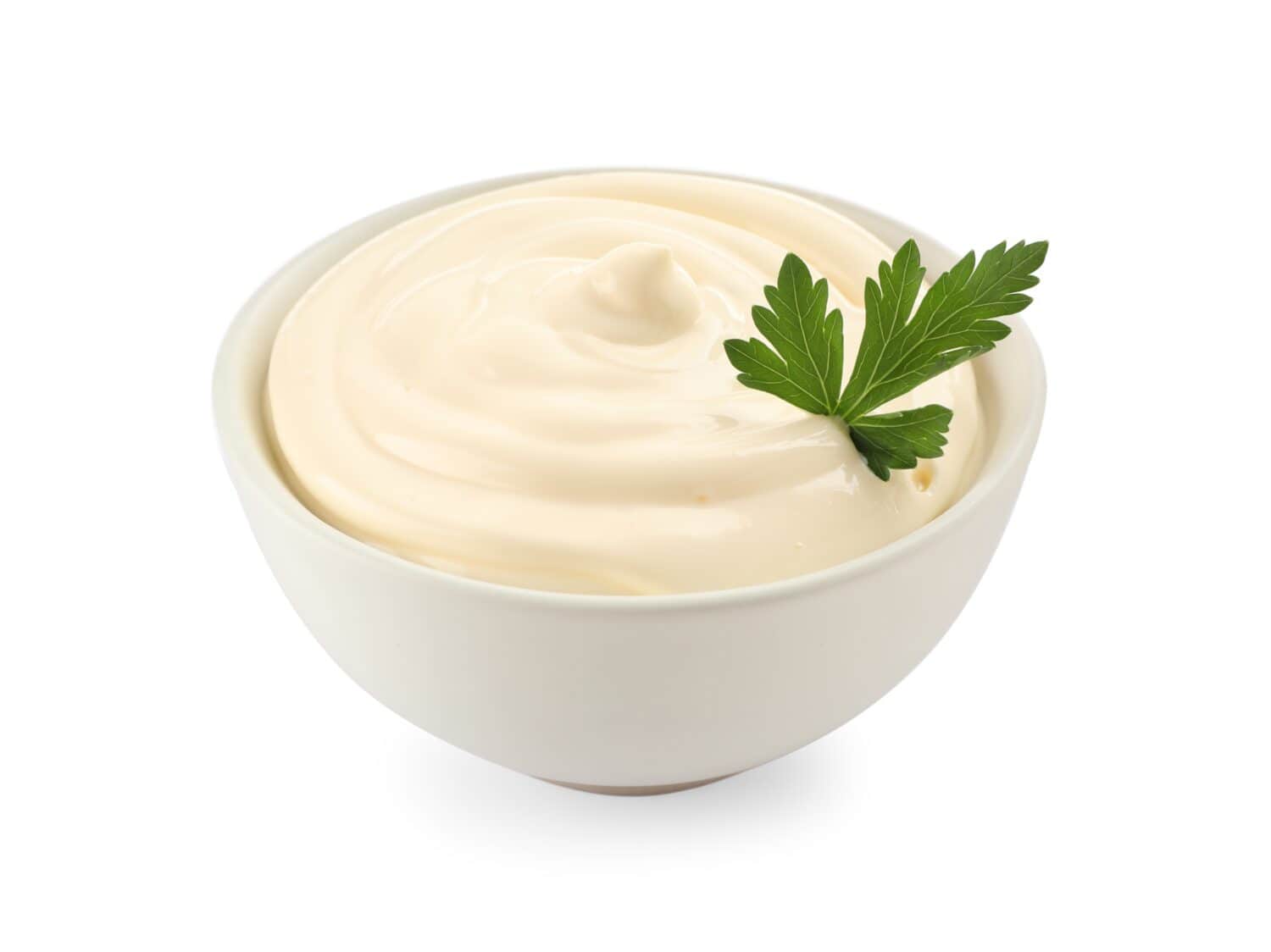
- parent/owner: Mrs. Taste
- established: 2013
- price point: $0.81/1.0 oz.
Mrs. Taste, a brand from Brazil, seems to have it all: Zero Sodium? Check. Zero Sugar? Check. High Fiber? Check. Keto and Paleo Friendly? Check and check. The only thing missing from Mrs. Taste is flavor. From non-existent to watery, the flavor pallet is totally off the rails — not just a little off. More like jumped the tracks and kept on chugging until it hit the bottom of the canyon off.
Questionable ingredients include guar gum, a thickening agent that produces changes in gut microbiota. These changes are linked to ulcerative colitis and inflammatory bowel disease (IBD). Because of these issues, guar gum is regulated by the FDA. Inflammatory bowel disease is on the rise in the U. S., affecting over two million Americans. Mrs. Taste also has microcrystalline cellulose which is refined wood pulp a bulking agent, fat substitute, and emulsifier.
Bottom line: You can’t even taste the wood pulp.
Simple Truth Plant Based Mayo Spread

- parent/owner: Kroger/Vanguard
- established:1883
- price point: $0.27/1.0 oz.
Simple Truth is Kroger’s natural foods brand and their plant-based mayo spread is an egg-free, vegan alternative to regular mayonnaise. The words simple and truth suggest that the product is healthful without unnecessary additives. Truly simple recipes do not contain ingredients like guar gum. You may remember guar gum from Mrs. Taste? It’s the thickening agent that produces changes in gut microbiota which are linked to ulcerative colitis and inflammatory bowel disease (IBD). This product also contains concentrates, specifically pea protein and lemon juice. The convenience that concentrates provide in mass production does not result in the best or most natural flavors. So, while its name conjures a healful food, its ingredients aren’t that simple.
Bottom line: The simple truth is that it pays to read labels.
Take This Retirement Quiz To Get Matched With An Advisor Now (Sponsored)
Are you ready for retirement? Planning for retirement can be overwhelming, that’s why it could be a good idea to speak to a fiduciary financial advisor about your goals today.
Start by taking this retirement quiz right here from SmartAsset that will match you with up to 3 financial advisors that serve your area and beyond in 5 minutes. Smart Asset is now matching over 50,000 people a month.
Click here now to get started.
Thank you for reading! Have some feedback for us?
Contact the 24/7 Wall St. editorial team.

